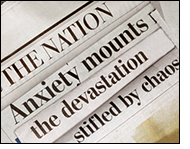It seems like every time I turn around, there’s another new crisis going on for a brand. Whether it be for a business large or small, nonprofit organization, celebrity or public figure—time after time, many crises are poorly handled.
Crises take many forms and can happen to any entity—typically by surprise. Natural disasters, industrial accidents, intentional events and terrorism can propel your brand into a public relations disaster. If you’re not sure how to handle them, you could set your brand up for irreparable damage.
The number one rule you must always remember when dealing with a crisis is to never stay quiet. You must always be accessible to the media to listen to public concern and communicate “what is” in an honest and open manner. On-going interaction with your publics is critical to establishing your credibility in the situation.
Communicate, Communicate, Communicate
Being able to think quickly and craft a message is essential to take hold of the situation. As soon as a crisis occurs, you’ll want to craft a three-part message to present to the media—to your publics.
You first want to show an appropriate level of compassion and concern for the situation and those involved/affected. Once again, show compassion and concern! Secondly, you will want to address your analysis of the situation—including what happened, how it happened, who was involved, who is affected, and how you are addressing the situation. Lastly, you will want to communicate the steps your organization is taking to prevent the problem from re-occurring.
Perception is reality.
Whether accurate or not, the perception of your crisis is what is your reality. I always say, “People make new decisions based on new information.” In public relations, this is the reason why you constantly want to be in front of the media providing updates as to what’s going on.
Crises are dynamic, abnormal events that are unpredictable. It can easily create a sense of uncertainty with your stakeholders. That is why it is important for the spokesperson for your organization to be out in front of the media and reassuring your concern and the steps you are taking to get to the bottom of the situation.
Don’t be on the defensive.
Even if you believe to not be at fault, it is crucial to not immediately point fingers. You will look as if you are on the defensive, raising concerns to the validity to what you are saying. If another party is thought to be involved, it is important to work with the proper authorities to build your case prior to making announcements.
The goal of communicating during a crisis is to inform your publics and maintain confidence in your products and services—your brand. True, you cannot plan for every type of crises that your organization may face, but addressing the issue head on and keeping your publics informed is the most important thing you can do from preventing crises from becoming a public relations disaster for your small business.
For more information on public relations services from SRJ Marketing Communications, give us a call today at 214-528-5775. We’ll be happy to talk with you about how your business can benefit from an effective public relations program.





